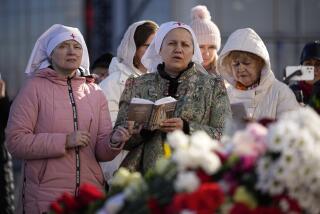Putin’s Rival Shows She’s Up for a Fight
- Share via
MOSCOW — Coming from a challenger for the presidency, the twin allegations were sensational: Russian President Vladimir V. Putin hid the truth about a theater hostage crisis in which 129 captives died, and authorities were somehow involved in apartment bombings blamed on Chechen rebels.
Irina Khakamada -- who aims to be the standard-bearer for Western-oriented, pro-democracy voters in March elections -- made the charges in an open letter last week released at a news conference. Responding to questions, she backed away a bit, but only a bit -- a sign that however enormous the popular president’s lead, Khakamada intends to wage a tough campaign.
“Khakamada can change the political situation in Russia only if she stakes it all and plays big,” said Yulia Latynina, an analyst with Echo of Moscow radio. “She can raise extremely uncomfortable questions and talk about extremely flammable issues.”
Many observers saw Khakamada’s late-December entry into the race as politically beneficial to Putin -- some said it was orchestrated by him -- because it provided him with a respectable rival and thereby kept up the appearance that Russia is a genuine democracy. Before she declared her candidacy, it had seemed that Putin might romp to victory without any real opponent, boosting the view that he was drifting toward authoritarianism.
Although some may still see Khakamada as a Putin pawn, her allegations have defused much of that criticism.
The implication of Khakamada’s accusations was that in both the 2002 theater crisis and the 1999 apartment bombings, authorities backing Putin may have wanted to see Russian citizens die and Chechen fighters painted as terrorists to boost support for military action in Chechnya and enhance the get-tough leader’s popularity.
Khakamada appeared to be simultaneously bidding for attention, pressing a serious demand for an impartial investigation of the incidents, asserting independence from the Kremlin and trying to stay out of legal trouble. Russia’s two key Western-style democratic parties were virtually wiped out of parliament in December elections, and Khakamada -- who leads one of them -- faces a daunting task in trying to pick up the pieces.
“I am appealing to people and tell them, ‘Don’t be afraid, don’t be silent, because everything is not lost yet,’ ” she said at the news conference.
In her written statement, she said that although friends warned her she would be killed if she spoke up, she was “not afraid of the terrorists in power.” At the news conference, she insisted, “I am not accusing Putin or the authorities that I may be killed.” But she added: “In Russia, we have a regime in which nobody is ensured against anything.”
The daughter of a Russian mother and a Japanese Communist who sought asylum in dictator Josef Stalin’s Soviet Union, Khakamada first made her mark as a businesswoman. She is now a co-chair of the Union of Right Forces.
Other key leaders of her party -- Boris Nemtsov, Anatoly B. Chubais and Yegor T. Gaidar -- became well-known in the West for their efforts to build a capitalist economy through rapid privatization under former President Boris N. Yeltsin. But none of them was willing to enter the race, so Khakamada nominated herself. She now must collect 2 million signatures by Jan. 28 to get on the ballot. Some leaders of the Union of Right Forces are backing the signature drive. Leaders of the other democratic grouping, Yabloko, are not, but Khakamada is seeking grass-roots help from its supporters.
Latynina said Khakamada showed political savvy by opening her campaign with an attack on Putin on two sensitive issues.
The theater crisis ended when authorities pumped sleeping gas into the building and knocked out nearly all the 41 Chechens, and approximately 900 hostages. Police then stormed the building. The hostage-takers were all shot and killed, many while asleep from the gas. Of the 129 hostages who died, all but two succumbed to a combination of the effects of the gas and lack of immediate medical attention.
Critics’ suspicions about the incident center on three issues: whether authorities wanted the crisis to end with deaths, to boost public support to fight on in Chechnya; why arrangements were not made to provide quick medical care to the large numbers of victims after the theater was retaken; and why every Chechen was killed, precluding interrogation and trial.
Similar doubts prevail about the 1999 apartment blasts, though authorities have tried hard to allay them. Last Monday, a Moscow court sentenced two men to life in prison for involvement in bombings that killed 246 people. Prosecutors said the pair made explosives, packed them in sugar sacks and drove them to Moscow and the southern city of Volgodonsk on the order of Chechen rebels.
The bombings, quickly blamed on Chechen rebels, became one of the justifications for sending Russian troops back into the separatist republic -- a move that launched the second war there in a decade. That show of toughness helped Putin, who was prime minister at the time, win election as president.
But suspicions have persisted that the secret services were behind the bombings. Putin denounced such rumors in 2000 as “raving madness.”
“There is nobody in the Russian special services capable of committing such a crime against our own people,” Putin said that year in excerpts of an interview published by the Kommersant daily newspaper. “It is immoral even to consider such a possibility.”
At her news conference, Khakamada said that “there are a lot of suspicious things” about the apartment bombings and urged an objective investigation.
“This is a feature of real democracy, especially when it comes to investigations connected with actions of officials and special services,” she said.
*
Alexei V. Kuznetsov of The Times’ Moscow Bureau contributed to this report.
More to Read
Sign up for Essential California
The most important California stories and recommendations in your inbox every morning.
You may occasionally receive promotional content from the Los Angeles Times.










